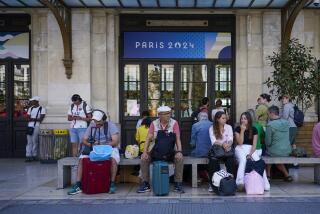Stunned Silence -- Then a Race to Escape Death
- Share via
MADRID — They had shoved their way onto the morning train, some headed for work and others to school.
The first blast stunned passengers into a momentary silence. Seconds later, the next explosion hurled people to the ground and shredded their bodies. Smoke, fire and screams filled the air.
Those who could, ran. They scrambled on top of each other, escaping through windows, over the dead.
The Atocha train terminal, one of Spain’s busiest, became a zone of horrific destruction when the first blasts Thursday morning tore into two trains, crumpling their midsections like paper and transforming their windows into a million tiny, razor-sharp fragments.
Explosions at two more stations followed, killing, in the end, nearly 200 people and injuring about 1,400 others.
As recounted by dozens of survivors and witnesses, panic set in gradually: The shock of what was happening seemed so great.
“I got out as I could, crawling on all fours,” said a man who gave only his first name, Eduardo, as he stood outside the Twelfth of October Hospital, his faced splattered in blood and crisscrossed with lacerations.
“The second blast, it was total,” said Felipe Rebolla, who was taking the train to work. “That’s when I realized it wasn’t just an accident. Everyone ran, one on top of another.”
Angel Grandes, a video editor, was waiting for a train at Atocha when the blasts shook the earth.
“I saw a 15-year-old boy, maybe 16, dead on the ground, with people rushing around him,” he said, crying as he recalled what he had seen. “I saw a woman, maybe 60, 65, thrown to the ground; only her legs moved, like in convulsions. There was another boy, maybe 14, who sat on the grass, just crying. Maybe he had lost his parents.”
Rescue workers who were the first on the scene said they had to dig through contorted cadavers, disembodied heads and severed legs to reach survivors.
“I saw people dead in their seats, their bodies destroyed,” said Rafael Villegas, who rushed to the scene with a handheld camera and whose images were broadcast on national TV. “It was like a war movie.” Left behind was a carpet of blood, shoes, bags and twisted metal.
The initial horror soon transformed into scenes of grief as sobbing, desperate parents, siblings and friends searched for the missing, making rounds at hospitals and ending up, many, at a makeshift morgue inside a convention hall on fairgrounds near the airport. Coroners, psychologists and priests were on hand to guide families through their pain.
Spain has asked Israeli forensic specialists for assistance, CNN reported.
“Identification of the bodies is going to be difficult in some cases,” Red Cross spokesman Miguel Angel Rodriguez said, “because they are arriving in plastic bags.”
Many of the victims were immigrants, some working in Spain illegally, and their relatives were reluctant to come forward to find them or claim their bodies.
Laura Jimenez, a psychologist, was counseling a Romanian man who could not find his fiancee.
“He says they came here from Romania to look for work and find a better life,” she said.
Close to midnight, Rodriguez said families were still arriving at the morgue. At the stricken train stations, Spaniards were setting out votive candles.
More to Read
Sign up for Essential California
The most important California stories and recommendations in your inbox every morning.
You may occasionally receive promotional content from the Los Angeles Times.













